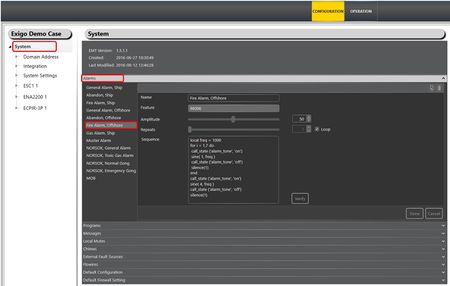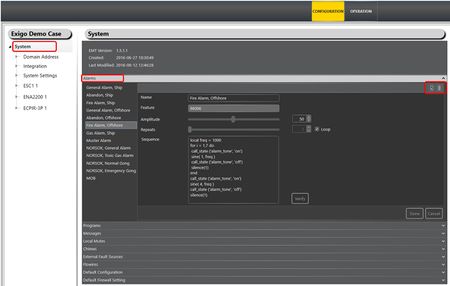Difference between revisions of "Alarm Generator"
(→Configuration) |
(→Alarm Generator Example) |
||
| Line 34: | Line 34: | ||
local freq = 1000 | local freq = 1000 | ||
for i = 1,7 do | for i = 1,7 do | ||
| − | + | call_state ('alarm_tone', 'on') | |
| − | + | sine( 1, freq ) | |
| − | + | call_state ('alarm_tone', 'off') | |
| − | + | silence(1) | |
End | End | ||
call_state ('alarm_tone', 'on') | call_state ('alarm_tone', 'on') | ||
Revision as of 11:17, 15 August 2016
This article explains how the Alarm Generator in Exigo can be used.
In Exigo there are already some Alarm Tones predefined. But it is also possible to make custom Alarm Tones or customize the predefined alarms.
The Alarm Generator is located on the PSC (Primary System Controller) and the alarm tones is generated by the system controller.
Contents
Configuration
The Alarm Generator is configured using the EMT.
- In the device tree select System.
- Under detailed view select Alarms.
- Select the alarm you want to edit.
Add or Delete Alarms
It is also possible to create new Alarms that can be configured from scratch.
- In the upper right corner select the Add button to create a new alarm.
To delete an alarm you can use the Recycle Bin next to the Add button.
Alarm Generator Script
The Alarm Generator is based on simple script programming.
Alarm Generator Example
- Script Example:
local freq = 1000 for i = 1,7 do call_state ('alarm_tone', 'on') sine( 1, freq ) call_state ('alarm_tone', 'off') silence(1) End call_state ('alarm_tone', 'on') sine( 4, freq ) call_state ('alarm_tone', 'off') silence(1)
Script Explanation:
- Local freq is a variable
- For <> end is a for loop which runs for i times
- Silence(seconds) is silence for seconds long
- Call_state is used for control outputs to see when alarm is off with follow alarm
- Sine(seconds, freq) is a sine tone lasting seconds long with frequency


